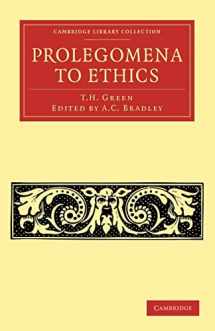
Prolegomena to Ethics (Cambridge Library Collection - Philosophy)
ISBN-13:
9781108040327
ISBN-10:
1108040322
Edition:
1
Author:
T. H. Green, A. C. Bradley
Publication date:
2011
Publisher:
Cambridge University Press
Format:
Paperback
468 pages
FREE US shipping
Book details
ISBN-13:
9781108040327
ISBN-10:
1108040322
Edition:
1
Author:
T. H. Green, A. C. Bradley
Publication date:
2011
Publisher:
Cambridge University Press
Format:
Paperback
468 pages
Summary
Prolegomena to Ethics (Cambridge Library Collection - Philosophy) (ISBN-13: 9781108040327 and ISBN-10: 1108040322), written by authors
T. H. Green, A. C. Bradley, was published by Cambridge University Press in 2011.
With an overall rating of 4.3 stars, it's a notable title among other
books. You can easily purchase or rent Prolegomena to Ethics (Cambridge Library Collection - Philosophy) (Paperback) from BooksRun,
along with many other new and used
books
and textbooks.
And, if you're looking to sell your copy, our current buyback offer is $0.3.
Description
T. H. Green (1836-82) was a leading member of the British Idealist movement, which adopted the continental philosophy of Hegel and Kant while rejecting utilitarianism. As well as being a prominent philosopher, Green was an influential educational reformer and an active member of the Liberal party. Green's writings can be placed into three categories: religion, philosophy and politics. This work was the most complete statement of Green's philosophy, although it remained unfinished at his death (though parts had been published in the philosophical review Mind in 1882). Edited by A. C. Bradley, a former student and brother of Green's fellow Idealist F.H. Bradley, the book, which contains four parts (on metaphysics, the will, the moral ideal and progress, and the application of moral philosophy to the guidance of conduct), was published posthumously in 1883. Like other Idealists, Green criticised empiricism for creating an unnecessary dualism between thought and the real.


We would LOVE it if you could help us and other readers by reviewing the book
Book review

Congratulations! We have received your book review.
{user}
{createdAt}
by {truncated_author}


